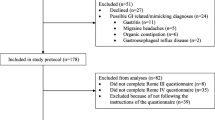Abstract
Background
Functional gastrointestinal diseases (FGIDs) are emerging as an important cause of morbidity in adolescents globally. The prevalence of FGIDs among Indian children or adolescents is not clear.
Methods
A cross-sectional school-based survey conducted in 1115 children aged 10–17 years attending four semi urban government schools of National capital territory (NCT) of Delhi. Rome III questionnaire was translated into Hindi and was filled by the students under supervision. Prevalence of FGIDs was calculated.
Results
Ten percent (112) adolescents had FGIDs. Out of 112, 52 % (58) were boys, and 48 % (54) were girls. 2.7 % (30) had functional dyspepsia, 1.3 % (15) had irritable bowel syndrome, 1.4 % (16) had abdominal migraine, 1.5 % (17) had aerophagia, 0.4 % (5) had functional abdominal pain syndrome, and 0.3 % (4) had functional abdominal pain. Prevalence of functional constipation, adolescent rumination syndrome, cyclical vomiting syndrome, and non-retentive fecal incontinence were 0.5 % (6), 0.3 % (4), 0.3 % (3), 0.4 % (5), respectively. Functional abdominal pain-related FGID were present in 6.3 % (70) children (35 boys and 35 girls). Functional constipation (4 vs. 2) and functional abdominal pain syndrome (4 vs. 1, p < 0.05) were significantly more in females.
Conclusions
The prevalence of functional gastrointestinal disorders in our study was 10 %. The most frequent FGID noted was functional dyspepsia.

Similar content being viewed by others
References
Primavera G, Amoroso B, Barresi A, et al. Clinical utility of Rome criteria managing functional gastrointestinal disorders in pediatric primary care. Pediatrics. 2010;125:e155–61.
Rasquin A, Di Lorenzo C, Forbes D, et al. Childhood functional gastrointestinal disorders. Gastroenterology. 2006;130:1527–37.
Dutta S, Mehta M, Verma IC. Recurrent abdominal pain in Indian children and its relation with school and family environment. Indian Pediatr. 1999;36:917–20.
Balani B, Patwari AK, Bajaj P, Diwan N, Anand VK. Recurrent abdominal pain—a reappraisal. Indian Pediatr. 2000;37:876–81.
Khanna V, Poddar U, Yachha SK. Etiology and clinical spectrum of constipation in Indian children. Indian Pediatr. 2010;47:1025–30.
Saps M, Seshadri R, Sztainberg M, Schaffer G, Marshall BM, Di Lorenzo C. A prospective school-based study of abdominal pain and other common somatic complaints in children. J Pediatr. 2009;154:322–6.
Hyams JS, Burke G, Davis PM, Rzepski B, Andrulonis PA. Abdominal pain and irritable bowel syndrome in adolescents: a community-based study. J Pediatr. 1996;129:220–6.
Saps M, Sztainberg M, Di Lorenzo C. A prospective community-based study of gastroenterological symptoms in school-age children. J Pediatr Gastroenterol Nutr. 2006;43:477–82.
Starfield B, Hoekelman RA, McCormick M, et al. Who provides health care to children and adolescents in the United States? Pediatrics. 1984;74:991–7.
Devanarayana NM, Adhikari C, Pannala W, Rajindrajith S. Prevalence of functional gastrointestinal diseases in a cohort of Sri Lankan adolescents: comparison between Rome II and Rome III criteria. J Trop Pediatr. 2011;57:34–9.
Mugie SM, Benninga MA, Di Lorenzo C. Epidemiology of constipation in children and adults: a systematic review. Best Pract Res Clin Gastroenterol. 2011;25:3–18.
Chitkara DK, Rawat DJ, Talley NJ. The epidemiology of childhood recurrent abdominal pain in Western countries: a systematic review. Am J Gastroenterol. 2005;100:1868–75.
Levy RL, Olden KW, Naliboff BD, et al. Psychosocial aspects of the functional gastrointestinal disorders. Gastroenterology. 2006;130:1447–58.
Miele E, Simeone D, Marino A, et al. Functional gastrointestinal disorders in children: an Italian prospective survey. Pediatrics. 2004;114:73–8.
Saps M, Adams P, Bonilla S, Chogle A, Nichols-Vinueza D. Parental report of abdominal pain and abdominal pain–related functional gastrointestinal disorders from a community survey. J Pediatr Gastroenterol Nutr. 2012;55:707–10.
Varni JW, Bendo CB, Nurko S, et al. Health-related quality of life in pediatric patients with functional and organic gastrointestinal diseases. J Pediatr. 2015;166:85–90.
Walker LS, Guite JW, Duke M, Barnard JA, Greene JW. Recurrent abdominal pain: a potential precursor of irritable bowel syndrome in adolescents and young adults. J Pediatr. 1998;132:1010–5.
Howell S, Poulton R, Talley NJ. The natural history of childhood abdominal pain and its association with adult irritable bowel syndrome: birth-cohort study. Am J Gastroenterol. 2005;100:2071–8.
Perquin CW, Hazebroek-Kampschreur AA, Hunfeld JA, et al. Pain in children and adolescents: a common experience. Pain. 2000;87:51–8.
Dong L, Dingguo L, Xiaoxing X, Hanming L. An epidemiologic study of irritable bowel syndrome in adolescents and children in China: a school-based study. Pediatrics. 2005;116:e393–6.
Baber KF, Anderson J, Puzanovova M, Walker LS. Rome II versus Rome III classification of functional gastrointestinal disorders in pediatric chronic abdominal pain. J Pediatr Gastroenterol Nutr. 2008;47:299–302.
Dong YY, Chen FX, Yu YB, et al. A school-based study with Rome III criteria on the prevalence of functional gastrointestinal disorders in Chinese college and university students. PLoS One. 2013;8:e54183.
Author information
Authors and Affiliations
Corresponding author
Ethics declarations
Conflict of interest
SD, VB, SS, AK, AS, and SG declare that they have no conflict of interest.
Ethics statement
The study has been performed in accordance with the ethical standards of the institutional and/or national research committee and with the 1964 Helsinki declaration and its later amendments or comparable ethical standards.
Electronic supplementary material
ESM 1
(DOCX 12 kb)
Rights and permissions
About this article
Cite this article
Bhatia, V., Deswal, S., Seth, S. et al. Prevalence of functional gastrointestinal disorders among adolescents in Delhi based on Rome III criteria: A school-based survey. Indian J Gastroenterol 35, 294–298 (2016). https://doi.org/10.1007/s12664-016-0680-x
Received:
Accepted:
Published:
Issue Date:
DOI: https://doi.org/10.1007/s12664-016-0680-x




